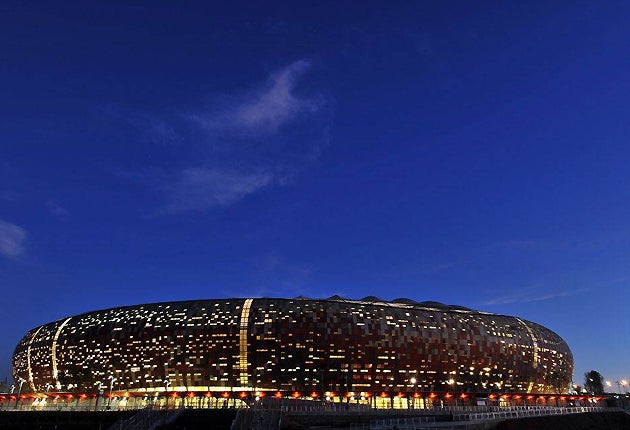The last-minute guide to getting to the World Cup and getting the most from your trip
Ticket sales are lower than expected, meaning now's the time to snap up a bargain World Cup holiday

Your support helps us to tell the story
From reproductive rights to climate change to Big Tech, The Independent is on the ground when the story is developing. Whether it's investigating the financials of Elon Musk's pro-Trump PAC or producing our latest documentary, 'The A Word', which shines a light on the American women fighting for reproductive rights, we know how important it is to parse out the facts from the messaging.
At such a critical moment in US history, we need reporters on the ground. Your donation allows us to keep sending journalists to speak to both sides of the story.
The Independent is trusted by Americans across the entire political spectrum. And unlike many other quality news outlets, we choose not to lock Americans out of our reporting and analysis with paywalls. We believe quality journalism should be available to everyone, paid for by those who can afford it.
Your support makes all the difference.Fifa took a leap into the unknown when it awarded the World Cup to a country of no great footballing pedigree, riven by social inequality and remote from the game's traditional strongholds in Europe and South America.
The finals may be an important moment in the global expansion of the game, but 50 days before South Africa sets the £3bn jamboree in motion at its new Soccer City Stadium in Johannesburg, there are worrying signs that the tournament is going to fall short of expectations as a spectacle and a money-spinner.
Officially about 90 per cent of the tournament's three million tickets have been sold, which is true in a sense, but many of the agencies and associations that have "bought" tickets and corporate hospitality packages have options to return them to the organisers, for a full refund, if they fail to shift them.
Ticket sales have been slowest in the host nation itself, despite a substantial price-cut to residents, who can gain entry to a qualifying match for about £11 – still beyond the reach of most. Fans travelling from England must pay a minimum of £63. A big domestic marketing drive was launched last week that should prevent the embarrassing prospect of South Africa playing their games in half-empty stadiums, but there's been a lukewarm response from further afield too. Substantial numbers of unsold tickets have been returned from the five other African nations taking part, and while the Americans and English have snapped up nearly 190,000 seats between them, continental Europe has shown much less interest. Barely 32,000 tickets have been sold in Germany, normally one of the best-supported countries. Only one of the 64 matches has sold out – the final.
You don't have to look hard to find explanations for this. The economic climate means supporters have less to spend on non-essentials. South Africa is far from everywhere, and the airlines have been roundly criticised for ramping up long-haul fares. Hotel rates and domestic airfares have risen so much that the government has launched two inquiries into price-fixing. There are the perennial worries of South Africa's high crime rate and racial unrest, with an average of 50 murders a day and warnings that foreign visitors could be targets.
London-based Red 24 will be one of several security firms on duty throughout the tournament, despite the presence of 41,000 dedicated police officers and 86,000 locally trained security guards covering the stadiums, hotels, fan parks, bars and restaurants. "There is a serious crime epidemic that the police cannot cope with," says Red 24's operations director, Neil Thompson. "Supporters can't just drink a few pints of lager and walk along the street. It's dangerous." Another security source says: "South Africa is a glorious country. Enjoy it – but watch your back, front and sides."
Some fans may have realised that it will be mid-winter in South Africa during the World Cup and that Johannesburg and the other venues in the High Veld can chill the bones in June and July. It may claim to be the world's most beautiful country, but only when the sun shines.
Finally, there's "football fatigue". After the 10-month season, players and fans alike, especially those based in Europe, need a natural break to lick their wounds and recharge their batteries come the end of May. Fifa's secretary-general Jerome Valcke, as concerned as anyone about slow ticket sales, concedes: "Maybe we are getting too much football [with] the Champions League or the Europa League, the club leagues or the cup competitions – we have matches every day."
But the World Cup is something special, and an African World Cup is unique. As 11 June approaches, prices will fall and some companies have already announced heavily discounted packages (see below). Moreover, those unsold tickets and hotel rooms returning to the open market should mean fans who haven't committed themselves still have time to make up their minds, without fear of missing the boat.
Join our commenting forum
Join thought-provoking conversations, follow other Independent readers and see their replies
Comments